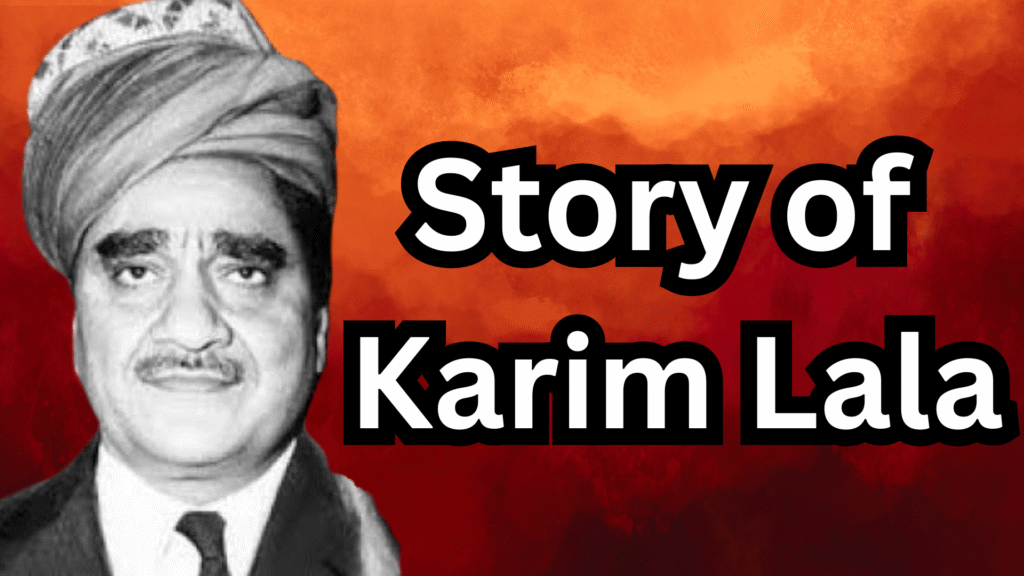Before the word “don” became a Bollywood cliché… before Dawood Ibrahim became a global criminal mastermind… before the city was called Mumbai — there was Karim Lala.
Mention his name in the alleys of Dongri, Bhendi Bazaar, or Nagpada even today, and you might hear someone say, “Woh zamana alag tha.” (That was a different era.)
This is the tale of Karim Lala — a man who didn’t simply dominate Mumbai’s underworld, but rewrote its regulations with something long forgotten in today’s ganglands: honor.
A Don Wasn’t Born. He Walked Here from Afghanistan.
Karim Lala’s real name was Abdul Karim Sher Khan. He was a Pashtun — rugged, proud, and deeply tribal. He came to Bombay in the early 1900s, from Kunar Province, Afghanistan, with little more than dust on his shoes and joy in his heart.
He labored the docks, loading cargo, sweating beneath the colonial solar, speakme broken Hindi with a thick Pukhtoon accessory. But what he lacked in language, he made up for in presence.
He stood tall, wearing white, turbaned like a warrior from the mountains. Even then, he didn’t mixture in — he stood out. And while the town’s underworld started developing like weeds inside the dark, Karim Lala didn’t just watch it occur. He became its gardener.
The Rise of the Pathan Gang
Karim Lala didn’t deal in politics or celebrity. He dealt in respect. And if that failed, he dealt in fists.
He formed the infamous Pathan Gang, mostly Afghan migrants like himself, known for their raw strength and readiness to bleed. They controlled illegal gambling, bootlegging, extortion, and eventually, land encroachment — but they weren’t your average criminals.
There were rules.
- No harming women.
- No drugs.
- No betrayal within the brotherhood.
If you had a problem — legal, personal, or financial — and you couldn’t go to the police, you went to Lala’s court. Sometimes under a banyan tree, sometimes in his Byculla office, but justice was swift.
People feared him. Yet people trusted him. That duality made him more powerful than any law.
The “Holy Trinity” of Crime: Lala, Mastan & Varadarajan
In the 1960s and 70s, Mumbai was run not by ministers, but by three men:
- Karim Lala, the mountain lion with a code.
- Haji Mastan, the suave smuggler in white suits.
- Varadarajan Mudaliar, the South Indian bootlegging baron.
They didn’t shake hands often, but they didn’t cross lines either. It was an era when gangsters weren’t anarchists — they were unofficial administrators of the city’s dirty underbelly.
And somehow, there was peace.
Karim Lala stood out among them — not just because of his background, but because of his old-school masculinity. He wasn’t interested in movie stars like Mastan, nor did he flaunt wealth like Varadarajan.
He walked the streets. Looked people in the eye. Spoke little. Watched a lot.
The Dawood Era: A New Enemy with a New Mind
Then came Dawood Ibrahim.
He was fast, young, and ruthless. No old-school values. Just ambition and bullets.
Dawood was from Dongri too — the same streets that once whispered Lala’s name with reverence now cheered a new king. But in his early days, Dawood respected Lala. He even sought his protection when police and rival gangs hunted him.
But the harmony wouldn’t last.
Where Lala believed in territory, Dawood believed in expansion. Where Lala held moral lines, Dawood stepped over them.
Eventually, the new world of crime made the old world irrelevant.
Karim Lala, in his 70s by then, didn’t fight the change. He stepped aside — not defeated, but disillusioned.
Beneath the Violence: The Man Few Knew
Here’s what most don’t know about the story of Karim Lala:
- He reportedly helped fund schools and clinics in poor neighborhoods.
- He resolved family feuds quietly, without demanding money.
- He protected Hindu shopkeepers during communal tensions, reminding people he ruled humans, not just Muslims.
He wasn’t a saint. But he wasn’t a mindless criminal either.
A shopkeeper in Bhindi Bazaar once said,
(These days when the police come, we hide. Back then, when Lala came, we brought out chairs and sat.
The End of the Line: From Don to Elder
Karim Lala dwindled from public lifestyles inside the 1980s, making uncommon appearances at spiritual activities or funerals. His empire crumbled, but not in blood — in silence.
He died in 2002, at the age of 90.
No last shootout. No epic betrayal. Just a quiet death in his own bed — the kind most criminals can only dream of.
And yet, when he passed, the city paused. People remembered. Streets buzzed again with stories. For a moment, Mumbai looked back and saw the ghost of a man who once ruled it—not with guns, but with presence.
Was Karim Lala a Criminal or a Code?
The story of Karim Lala doesn’t fit into clean categories.
Yes, he was a gangster — he extorted, he fought, and he built an empire of fear.
But he was also a relic of a world where even crime had dignity. Where loyalty mattered. Where betrayal wasn’t casual. Where a woman could walk past a den and not be harassed.
He didn’t need to shout to be heard. He didn’t need to kill to be obeyed.
That kind of power—real, raw, and rare—is extinct today.
Final Thoughts: When the Shadows Had Shape
In today’s Mumbai, underworld dons are global criminals. Their names flash on Interpol lists, not in whispers across street corners. They hide in Dubai, not in the local masjid.
But once, there was a man—tall, stoic, unforgiving-who walked the streets of Bombay and became a legend without needing to say much.



